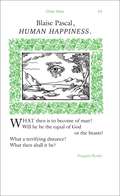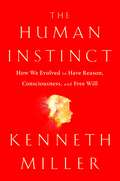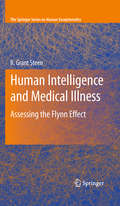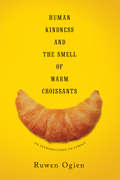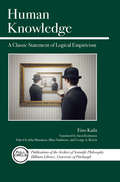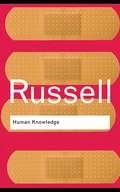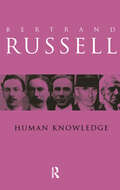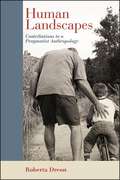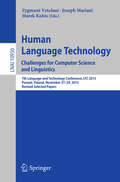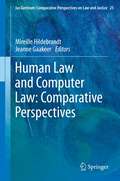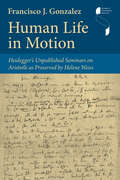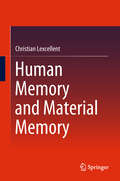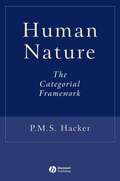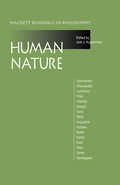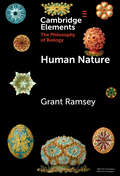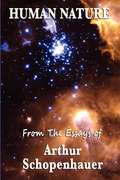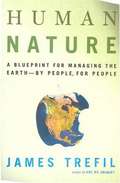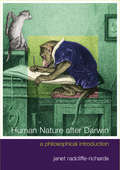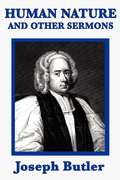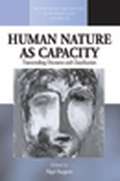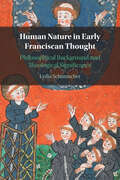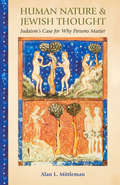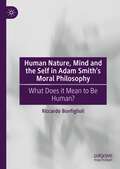- Table View
- List View
Human Happiness (Penguin Great Ideas)
by Blaise PascalCreated by the seventeenth-century philosopher and mathematician Pascal, the essays contained in Human Happiness are a curiously optimistic look at whether humans can ever find satisfaction and real joy in life – or whether a belief in God is a wise gamble at best. Throughout history, some books have changed the world. They have transformed the way we see ourselves – and each other. They have inspired debate, dissent, war and revolution. They have enlightened, outraged, provoked and comforted. They have enriched lives – and destroyed them. Now Penguin brings you the works of the great thinkers, pioneers, radicals and visionaries whose ideas shook civilization and helped make us who we are.
The Human Instinct: How We Evolved to Have Reason, Consciousness, and Free Will
by Kenneth R. MillerA radical, optimistic exploration of how humans evolved to develop reason, consciousness, and free will.Lately, the most passionate advocates of the theory of evolution seem to present it as bad news. Scientists such as Richard Dawkins, Lawrence Krauss, and Sam Harris tell us that our most intimate actions, thoughts, and values are mere byproducts of thousands of generations of mindless adaptation. We are just one species among multitudes, and therefore no more significant than any other living creature. Now comes Brown University biologist Kenneth R. Miller to make the case that this view betrays a gross misunderstanding of evolution. Natural selection surely explains how our bodies and brains were shaped, but Miller argues that it’s not a social or cultural theory of everything. In The Human Instinct, he rejects the idea that our biological heritage means that human thought, action, and imagination are pre-determined, describing instead the trajectory that ultimately gave us reason, consciousness and free will. A proper understanding of evolution, he says, reveals humankind in its glorious uniqueness—one foot planted firmly among all of the creatures we’ve evolved alongside, and the other in the special place of self-awareness and understanding that we alone occupy in the universe. Equal parts natural science and philosophy, The Human Instinct is a moving and powerful celebration of what it means to be human.
Human Intelligence and Medical Illness
by R. Grant SteenThere's little doubt that people are growing smarter. This effect is so strong that IQ tests must be renormed periodically to prevent classifying an overabundance of people as geniuses. The question is why is this collective rise in IQ - known as the Flynn effect -occurring? Possible theories to explain the Flynn effect have ranged from better parenting to faster evolution. Bringing a bold new voice to the debate, Human Intelligence and Medical Illness sets out a simple definition of intelligence that is appropriate for assessing intelligence at the population level. The definition is then used to probe the relationship between population intelligence and public health. This volume uses the latest medical and behavioral science research to argue that declines in serious disease and illness-causing conditions (e.g., lead paint in buildings) correlate strongly with continued cognitive gains in both developed and developing countries. Current political realities explain why the Flynn effect should be approached as a public policy as well as a public health issue. This provocative volume: Reviews the most widely held hypotheses accounting for the Flynn effect. Examines the relationship between intelligence and public health. Assesses the extent to which public health improvements can potentially account for the Flynn effect. Details how treatment of common medical problems may result in a substantial rise in IQ. Explores the possibility of continued IQ gains in the United States and worldwide. Reframes the Flynn effect in the contexts of public health, early childhood education, and social justice. With its groundbreaking findings on the causes of cognitive impairment and the possibility of cognitive improvement, Human Intelligence and Medical Illness is must-reading for researchers, professors, and graduate students in developmental psychology, education, public health, psychiatry, neuroscience, social work, and related fields.
Human Kindness and the Smell of Warm Croissants: An Introduction to Ethics
by Ruwen OgienHuman Kindness and the Smell of Warm Croissants makes philosophy fun, tactile, and popular. Moral thinking is simple, Ruwen Ogien argues, and as inherent as the senses. In our daily experiences, in the situations we confront and in the scenes we witness, we develop an understanding of right and wrong as sophisticated as the moral outlook of the world's most gifted philosophers. By drawing on this knowledge to navigate life's most perplexing problems, ethics becomes second nature.Ogien explores, through experimental philosophy and other methods, the responses nineteen real-world conundrums provoke. Is a short, mediocre life better than no life at all? Is it acceptable to kill a healthy person so his organs can save five others? Would you swap a "natural" life filled with frustration, disappointment, and partial success for a world in which all of your needs are met, but through artificial and mechanical means? Ogien doesn't seek to show how difficult it is to determine right from wrong or how easy it is for humans to become monsters or react like saints. Helping us tap into the wisdom and feeling we already possess in our ethical "toolboxes," Ogien instead encourages readers to question moral presuppositions and rules; embrace an intuitive sense of dignity, virtue, and justice; and pursue a pluralist ethics suited to the principles of human kindness.
Human Knowledge
by George A. Reisch Juha Manninen Ilkka Niiniluoto Eino Kaila Anssi KorhonenThe Finnish philosopher Eino Kaila (1890-1958) wrote a classic statement of Logical Empiricism. He had experienced the foundational debates of the Vienna Circle, invited by Moritz Schlick, during the early summer of 1929. Kaila was a keen follower of the further developments of the Circle. His synoptic presentation and analysis of the basic themes, or "theses", of the movement was based on his lectures as professor of theoretical philosophy at the University of Helsinki.The work appeared as a book in Finnish in 1939. A Swedish translation by Georg Henrik von Wright followed immediately. Earlier, a translation of his philosophical essays from the original German, entitled Reality and Experience, edited by Robert S. Cohen, appeared in 1979. However, this is the first translation of Kaila's major epistemological work.Kaila's text remains a source for re-evaluations of Logical Empiricism
Human Knowledge: Its Scope and Limits
by Bertrand RussellHow do we know what we "know"? How did we –as individuals and as a society – come to accept certain knowledge as fact? In Human Knowledge, Bertrand Russell questions the reliability of our assumptions on knowledge. This brilliant and controversial work investigates the relationship between ‘individual’ and ‘scientific’ knowledge. First published in 1948, this provocative work contributed significantly to an explosive intellectual discourse that continues to this day.
Human Knowledge: Its Scope and Value
by Bertrand RussellRussell's classic examination of the relation between individual experience and the general body of scientific knowledge. It is a rigorous examination of the problems of an empiricist epistemology.
Human Landscapes: Contributions to a Pragmatist Anthropology (SUNY series in American Philosophy and Cultural Thought)
by Roberta DreonHuman Landscapes works out a pragmatist anthropology which the Classical Pragmatists never put together in a comprehensive form—despite the many insights on the topic to be found in Dewey's, James's, and Mead's texts. Roberta Dreon retrieves and develops this material in its astonishing modernity concerning current debates on the mind as embodied and enacted, philosophy of the emotions, social theory, and studies about the origins of human language. By assuming a basic continuity between natural developments and human culture, this text highlights the qualitative, pre-personal, habitual features of human experience constituting the background to rational decision-making, normativity, and reflection. The book rests on three pillars: a reconceptualization of sensibility as a function of life, rather than as a primarily cognitive faculty; a focus on habits, understood as pervasive features of human behaviors acquired by attuning to the social environment; and an interpretation of human experience as "enlanguaged," namely as contingently yet irreversibly embedded in a linguistic environment that has important loop effects on human sensibility and habitual conduct.
Human Language Technology. Challenges for Computer Science and Linguistics: 7th Language and Technology Conference, LTC 2015, Poznań, Poland, November 27-29, 2015, Revised Selected Papers (Lecture Notes in Computer Science #10930)
by Zygmunt Vetulani Joseph Mariani Marek KubisThis book constitutes the refereed proceedings of the 7h Language and Technology Conference: Challenges for Computer Science and Linguistics, LTC 2015, held in Poznan, Poland, in November 2015. The 31 revised papers presented in this volume were carefully reviewed and selected from 108 submissions. The papers selected to this volume belong to various fields of: Speech Processing; Multiword Expressions; Parsing; Language Resources and Tools; Ontologies and Wordnets; Machine Translation; Information and Data Extraction; Text Engineering and Processing; Applications in Language Learning; Emotions, Decisions and Opinions; Less-Resourced Languages.
Human Law and Computer Law: Comparative Perspectives
by Jeanne Gaakeer Mireille HildebrandtThe focus of this book is on the epistemological and hermeneutic implications of data science and artificial intelligence for democracy and the Rule of Law. How do the normative effects of automated decision systems or the interventions of robotic fellow 'beings' compare to the legal effect of written and unwritten law? To investigate these questions the book brings together two disciplinary perspectives rarely combined within the framework of one volume. One starts from the perspective of 'code and law' and the other develops from the domain of 'law and literature'. Integrating original analyses of relevant novels or films, the authors discuss how computational technologies challenge traditional forms of legal thought and affect the regulation of human behavior. Thus, pertinent questions are raised about the theoretical assumptions underlying both scientific and legal practice.
Human Life in Motion: Heidegger's Unpublished Seminars on Aristotle as Preserved by Helene Weiss (Studies in Continental Thought)
by Francisco J. GonzalezHuman Life in Motion presents for the first time the previously unpublished transcripts of the seminars on Aristotle Martin Heidegger gave in the 1920s. These transcripts reveal much about the evolution of his thought during that time.Detailed student transcripts for these seminars appear among the papers of one of Heidegger's students, Helene Weiss, held today in the Special Collections Department of Stanford University. Analyzing and organizing hundreds of pages of these transcripts written by different students, Francisco Gonzalez brilliantly reconstructs the original seminars. He summarizes what Heidegger presented and claimed in each class. Gonzalez also throws into relief the overarching philosophical significance of the seminars, showing how the different interpretative moves or claims are connected and where they lead, something which in turn requires explicating them in the context of both the Aristotelian texts discussed and Heidegger's own thought during this period.Essential reading for students and scholars of Heidegger or Aristotle, Human Life in Motion is a publishing event that forces a reconsideration of the thought and legacy of both philosophers.
Human Memory and Material Memory
by Christian LexcellentThis book investigates the fascinating concept of a continuum between human memory and memory of materials. The first part provides state-of-the-art information on shape memory alloys and outlines a brief history of memory from the ancient Greeks to the present day, describing phenomenological, philosophical, and technical approaches such as neuroscience. Then, using a wealth of anecdotes, data from academic literature, and original research, this short book discusses the concepts of post-memory, memristors and forgiveness, highlights the analogies between materials defects and memory traces in the human brain. Lastly, it tackles questions of how human memory and memory of materials work together and interact. With insights from materials mechanics, neuroscience and philosophy, it enables readers to understand and continue this open debate on human memory.
Human Mobility and Technological Transfer in the Prehistoric Mediterranean: Human Mobility and Technological Transfer In The Prehistoric Mediterranean
by Evangelia Kiriatzi Carl KnappettThe diverse forms of regional connectivity in the ancient world have recently become an important focus for those interested in the deep history of globalisation. This volume represents a significant contribution to this new trend as it engages thematically with a wide range of connectivities in the later prehistory of the Mediterranean, from the later Neolithic of northern Greece to the Levantine Iron Age, and with diverse forms of materiality, from pottery and metal to stone and glass. With theoretical overviews from leading thinkers in prehistoric mobilities, and commentaries from top specialists in neighbouring domains, the volume integrates detailed case studies within a comparative framework. The result is a thorough treatment of many of the key issues of regional interaction and technological diversity facing archaeologists working across diverse places and periods. As this book presents key case studies for human and technological mobility across the eastern Mediterranean in later prehistory, it will be of interest primarily to Mediterranean archaeologists, though also to historians and anthropologists.
Human Nature: The Categorial Framework
by P. M. HackerThis major new study by one of the most penetrating and persistent critics of philosophical and scientific orthodoxy, returns to Aristotle in order to examine the salient categories in terms of which we think about ourselves and our nature, and the distinctive forms of explanation we invoke to render ourselves intelligible to ourselves. The culmination of 40 years of thought on the philosophy of mind and the nature of the mankind Written by one of the world’s leading philosophers, the co-author of the monumental 4 volume Analytical Commentary on the Philosophical Investigations (Blackwell Publishing, 1980-2004) Uses broad categories, such as substance, causation, agency and power to examine how we think about ourselves and our nature Platonic and Aristotelian conceptions of human nature are sketched and contrasted Individual chapters clarify and provide an historical overview of a specific concept, then link the concept to ideas contained in other chapters
Human Nature: A Reader
by Joel J. KuppermanThis anthology provides a set of distinctive, influential views that explore the mysteries of human nature from a variety of perspectives. It can be read on its own, or in conjunction with Joel Kupperman's text, Theories of Human Nature.
Human Nature (Elements in the Philosophy of Biology)
by Grant RamseyHuman nature is frequently evoked to characterize our species and describe how it differs from others. But how should we understand this concept? What is the nature of a species? Some take our nature to be an essence and argue that because humans lack an essence, they also lack a nature. Others argue for non-essentialist ways of understanding human nature, which usually aim to provide criteria for sorting human traits into one of two bins, the one belonging to our nature and the other outside our nature. This Element argues that both the essentialist and trait bin approaches are misguided. Instead, the author develops a trait cluster account of human nature, which holds that human nature is based on the distribution of our traits over our (actual and possible) life histories. One benefit of this account is that it aligns human nature with the human sciences, rendering the central concern of the human sciences to be the study of human nature. This title is also available as Open Access on Cambridge Core.
Human Nature
by Arthur SchopenhauerSchopenhauer believed in the supremacy of will over intellect, and he wrote extensively on the motivations behind actions. These six essays, drawn from Parerga and posthumously published works, include observations on government, free will and fatalism, character, moral instinct, and ethics. They reflect the author's wide range of interests and offer an accessible approach to his philosophy.
Human Nature: A Blueprint for Managing the Earth-By People, for People
by James S. TrefilTrefil, a leading scientist, is certainly qualified to tackle the controversial, timely topic of how humans ought to affect the planet they live on. He argues that from the dawn of an agricultural society, man has always engineered nature to suit his needs. And because we're the only form of life with the ability to move mountains (as much literally as metaphorically), there's no rational reason not to manage the environment
Human Nature After Darwin: A Philosophical Introduction
by Janet Radcliffe RichardsHuman Nature After Darwin is an original investigation of the implications of Darwinism for our understanding of ourselves and our situation. It casts new light on current Darwinian controversies, also providing an introduction to philosophical reasoning and a range of philosophical problems.Janet Radcliffe Richards claims that many current battles about Darwinism are based on mistaken assumptions about the implications of the rival views. Her analysis of these implications provides a much-needed guide to the fundamentals of Darwinism and the so-called Darwin wars, as well as providing a set of philosophical techniques relevant to wide areas of moral and political debate.The lucid presentation makes the book an ideal introduction to both philosophy and Darwinism as well as a substantive contribution to topics of intense current controversy. It will be of interest to students of philosophy, science and the social sciences, and critical thinking.
Human Nature And Conduct
by John Dewey John CappsIn Human Nature and Conduct, the philosopher John Dewey looks at the connection between human nature and morality. While some people believe that we are naturally good, others believe that we are naturally evil. Likewise, while some people believe that morality is all relative, others believe that moral laws are as universal as laws of nature. In these twenty-six succinct chapters Dewey argues that morality is not so simple. He claims that morality depends on both individual people and societies, on both nature and nurture, and on a complex interaction between biological impulses, social customs, and human intelligence. He argues against those who believe morality depends on the will of the majority, those who believe it depends on the will of God and, most of all, those who believe the purpose of morality is to protect us from our own instincts. In Human Nature and Conduct Dewey gives us a new perspective on morality.
Human Nature and other Sermons
by Joseph ButlerJoseph Butler was an English bishop, theologian, apologist, and philosopher. He was born in Wantage in the English county of Berkshire. He is known, among other things, for his critique of Thomas Hobbes's egoism and John Locke's theory of personal identity. During his life and after his death, Butler influenced many philosophers, including David Hume, Thomas Reid, and Adam Smith.
Human Nature As Capacity
by Nigel RapportWhat is it to be human? What are our specifically human attributes, our capacities and liabilities? Such questions gave birth to anthropology as an Enlightenment science. This book argues that it is again appropriate to bring "the human" to the fore, to reclaim the singularity of the word as central to the anthropological endeavor, not on the basis of the substance of a human nature - "To be human is to act like this and react like this, to feel this and want this" - but in terms of species-wide capacities: capabilities for action and imagination, liabilities for suffering and cruelty. The contributors approach "the human" with an awareness of these complexities and particularities, rendering this volume unique in its ability to build on anthropology's ethnographic expertise.
Human Nature in Early Franciscan Thought: Philosophical Background and Theological Significance
by Lydia SchumacherIn this book, Lydia Schumacher challenges the common assumption that early Franciscan thought simply reiterates the longstanding tradition of Augustine. She demonstrates how scholars from this tradition incorporated the work of Islamic and Jewish philosophers, whose works had recently been translated from Arabic, with a view to developing a unique approach to questions of human nature. These questions pertain to perennial philosophical concerns about the relationship between the body and the soul, the work of human cognition and sensation, and the power of free will. By highlighting the Arabic sources of early Franciscan views on these matters, Schumacher illustrates how scholars working in the early thirteenth century anticipated later developments in Franciscan thought which have often been described as novel or unprecedented. Above all, her study demonstrates that the early Franciscan philosophy of human nature was formulated with a view to bolstering the order's specific theological and religious ideals.
Human Nature & Jewish Thought: Judaism's Case for Why Persons Matter
by Alan L. MittlemanThis book explores one of the great questions of our time: How can we preserve our sense of what it means to be a person while at the same time accepting what science tells us to be true--namely, that human nature is continuous with the rest of nature? What, in other words, does it mean to be a person in a world of things? Alan Mittleman shows how the Jewish tradition provides rich ways of understanding human nature and personhood that preserve human dignity and distinction in a world of neuroscience, evolutionary biology, biotechnology, and pervasive scientism. These ancient resources can speak to Jewish, non-Jewish, and secular readers alike.Science may tell us what we are, Mittleman says, but it cannot tell us who we are, how we should live, or why we matter. Traditional Jewish thought, in open-minded dialogue with contemporary scientific perspectives, can help us answer these questions. Mittleman shows how, using sources ranging across the Jewish tradition, from the Hebrew Bible and the Talmud to more than a millennium of Jewish philosophy. Among the many subjects the book addresses are sexuality, birth and death, violence and evil, moral agency, and politics and economics. Throughout, Mittleman demonstrates how Jewish tradition brings new perspectives to--and challenges many current assumptions about--these central aspects of human nature.A study of human nature in Jewish thought and an original contribution to Jewish philosophy, this is a book for anyone interested in what it means to be human in a scientific age.
Human Nature, Mind and the Self in Adam Smith's Moral Philosophy: What Does it Mean to Be Human?
by Riccardo BonfiglioliThis book investigates the problematisation in Adam Smith's moral philosophy of a classical question: what makes us human beings from a moral standpoint? To do this, Riccardo Bonfiglioli explores the relationship between the concepts of ‘human nature’, ‘mind’ and ‘the self’ in order to reconstruct Smith’s theory of subjectivity. After providing a systematic reconstruction of Adam Smith’s conceptions of ‘human nature’ , ‘mind’ and ‘the self’ – exploring some aspects of Smith’s philosophy (nature, philosophy of history, sympathy and imagination) and their empirical expressions (education, conduct and character) – Bonfiglioli argues that, in Adam Smith’s work, the meaning of ‘moral human beings’ would depend on the human being’s effort to live in harmony with oneself and the others. According to Bonfiglioli, in Smith’s moral theory, this ‘harmony with oneself and the others’ would be achieved in relation to a certain kind of awareness that can be possible when human beings try to judge the conduct and try to act according to the impartial spectator. Specifically, this impartial spectator is reinterpreted by the author in the light of the concept of immediacy.
